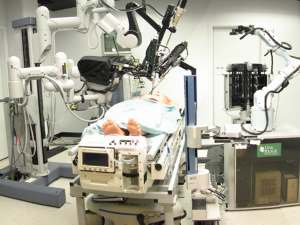
The rapidly developing field of surgical robotics is literally changing the face of modern surgery. Israel is one of the world leaders in this industry, and this is no accident.
Of all surgical robots ever developed, only a handful have been certified to date. Three of them were developed by the Israelis.
According to Alon Wolf, founder and director of the Laboratory of Biorobotics and Biomechanics at the Technion Institute of Technology in Israel, the very idea of surgical robotics arose from the need to provide immediate medical care to soldiers on the battlefield without putting the surgeon at risk: the intervention should ideally be performed remotely from a bunker. This concept has not yet been fully realized, but it has given a tremendous impetus to the development of medical technology in a given direction and has been successfully applied in conventional “peaceful” medicine.
“Israeli developments, like the American ones, are based on a knowledge base in the military,” explains Ziv Tamir, the first distributor of the Da Vinci Surgical System in Israel. – This is what makes them fundamentally different from all surgical robotics projects in other countries, which are based on university “desk” science and not always focused on specific practical needs.
Meet Certified Israeli Inventions
Mazor Robotics in Caesarea is one of the world’s leading innovators in robot-assisted neurosurgery and spinal surgery. The first product, SpineAssist, received FDA certification back in 2004. The next-generation device developed on its basis, the RenaissanceGuidance System, has now been implemented in nearly 100 medical centers around the world. The robot is used to take biopsies, for reconstructive surgery, for surgical correction of scoliosis, for spondylodesis and other manipulations requiring the highest precision.
The Flex Robotic System from MedRobotics, based on Alon Wolf’s “robotic snake” development, is capable of penetrating body cavities inaccessible to the surgeon’s direct vision. This is especially true for head and neck surgery.
MST (Medical Surgery Technologies) manufactures AutoLap, a video-guided system for optimal positioning of the laparoscope, which helps the surgeon to orientate himself and stabilize his movements. The surgeon places a wireless ring-shaped device on the index finger that communicates with the AutoLap system. Special purpose software captures and interprets visual information from the laparoscope and maneuvers in coordination with the surgeon’s gesture signals in real time. “We’re comparing this system to the Xbox in clinical practice,” explains Moti Freemer, the firm’s director. – “The system ‘understands’ gestures. While most robotic systems are controlled by joysticks or other devices, the MST responds directly to the movements of the surgeon’s hand.
And now a glimpse into the not-too-distant future of global medicine – 4 Israeli inventions, one of which is in the process of being certified and three others are in development
Human Extensions has developed an ergonomic bionic surgical glove that improves precision and smooth movement. The development is currently in the process of FDA (USA) and CE (European Union) certification. According to Tami Frankel, director of the firm, the device allows for customization for a specific surgeon and a specific task. “This innovative solution will allow surgeons for the first time to perceive the patient’s anatomy in the manner of direct perception, similar to how it is perceived when performing open access surgery,” emphasizes Frenkel, “as if the surgeon’s hands were in the patient’s body cavity.
Microbot Medical, founded in 2010, is developing two pioneering devices – the ViRob and the TipCAT. The ViRob is an autonomous “submarine-like” micro-robot that allows a surgeon to launch a video camera, drug or shunt into the narrowest and hardest-to-reach places of the body (blood vessels, digestive or respiratory organs), and to perform minimally invasive, controlled interventions MRI or CT. TipCAT – flexible self-propelled endoscope for use in the colon, blood vessels, and urinary tract. Safe, fast and gentle movement within the structures of the body is ensured by successive successive inflation and deflation of the “cylinders” – sections of the probe.
XACT Robotics is currently developing a robotic system for precise needle insertion and guidance during minimally invasive CT-guided procedures such as lung biopsies. Any deviation from the planned trajectory, even the smallest one, is immediately detected and corrected without the need to reinsert the needle or change the patient’s position.
Original source: https://www.doktorisrael.ru







